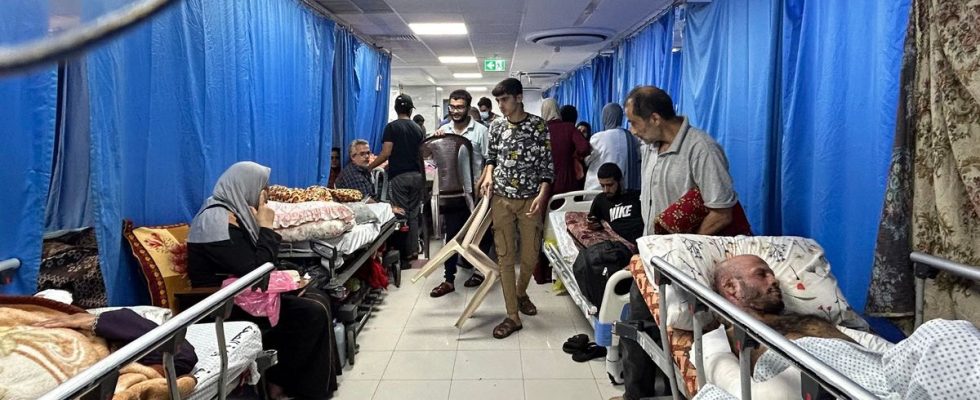The numbers and times tell part of the urgency of the situation on site. This Monday, Thomas White, the head of the UN agency for Palestinian refugees, set a course: within 48 hours, humanitarian operations in the Gaza Strip will cease, due to lack of fuel. According to Hamas, which administers this territory, hospitals in the north are out of service, deprived of electricity.
According to an AFP journalist present on site, “Israeli tanks, armored vehicles and personnel carriers surround the area” of Al-Chifa hospital, the largest establishment in the Gaza Strip. “Seven premature babies” and “27 patients in intensive care” died, according to the Islamist movement. The Palestinian territory has been under total siege by Israel since October 9, two days after the bloody Hamas attack on Israeli territory. According to the UN, 1.6 of the 2.4 million inhabitants have been displaced by the war.
Present last Thursday at the Elysée during the humanitarian conference for Gaza, the vice-president of Doctors of the World Jean-François Corty testifies to the desperate situation experienced by his teams in Gaza, while imploring a ceasefire, the only credible solution according to him to improve the situation.
One of your caregivers, a 28-year-old doctor who coordinated medical care, died a few days ago in Gaza. How is the rest of the team doing, physically and mentally?
The situation is very difficult, as for all civilians. The trickle supply of humanitarian aid to southern Gaza cannot trickle up to the north. Of the twenty or so members on site (Editor’s note: Gazans trained in emergency care), one doctor still works in a hospital.
But most of our colleagues are no longer operational. They are looking for drinking water, food, they know that they can die in bombings anywhere, including in the south. Humanitarian operations are largely compromised, healthcare systems are out of service. To get help in, the minimum is a ceasefire. It is impossible to supply hospitals with medicines, fuel oil and food by only ordering humanitarian breaks.
You indicated that caregivers are forced to carry out low-level war medicine. They are prevented from doing what type of operations?
Due to the blockade, pharmacies are not restocked and generators no longer provide electricity. There is no longer any possibility of operating operating theatres, respirators no longer work, neither does dialysis, incubators are in danger. The deaths are linked to the bombings but we do not count the people who died due to a simple lack of care.
Patients die from illnesses for which the treatment is known, without being able to treat them due to lack of medication. Of the 36 hospitals in the territory, most are not supplied (Editor’s note: 20 hospitals are no longer operational, according to the UN agency responsible for humanitarian coordination), there are sick people, injured people, they are dying. We can only practice low-level war medicine because surgery is out of service, there are no more anesthetics, no more painkillers, no more antibiotics.
Do you have any news on the situation at Al-Chifa hospital? Generally speaking, how can the evacuation of patients be organized?
We don’t have teams inside Al-Chifa. But given the security conditions, the bombings and a lack of supplies, it is quite credible to say that the hospital is suffering and that it no longer has the capacity to meet the needs of thousands of people. attendees. Trying to transfer these patients to partially functional hospitals is extremely dangerous.
There are attempts to evacuate the wounded, the sick, from the north to the south, it is very complicated without logistics to transport patients in very weak clinical condition. If you don’t have an ambulance, or equipment to monitor the constants, the transfer is impossible. Humanitarian pauses will not be enough. All the codes of international humanitarian law which are intended to humanize war are shattered. Hospitals are bombed, NGO members die. No codes of war are any longer respected, we are in a humanitarian crisis, we are heading towards a crisis of humanity. The inhabitants need the humanitarian aid positioned in Egypt to arrive massively in good conditions.

